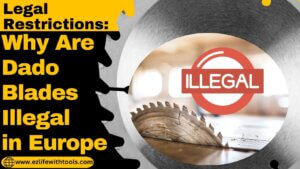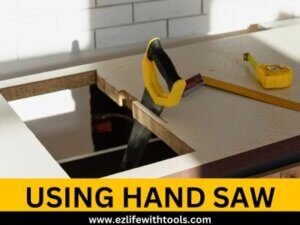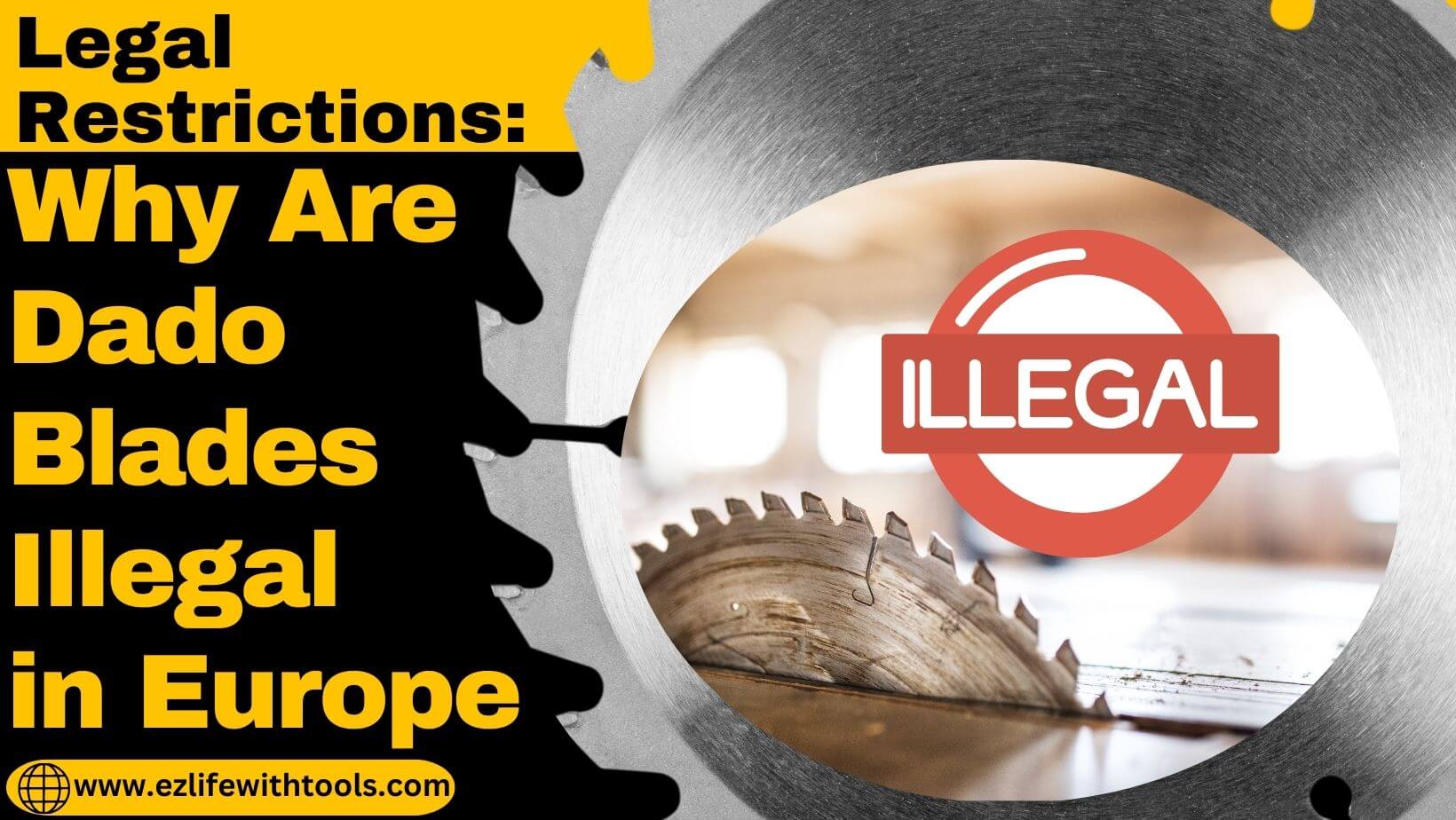Why Are Dado Blades Illegal in Europe?: Legal Restrictions
Dado blades are a top-rated woodworking tool worldwide but are controversial in Europe. The European

Union and its member countries have implemented some strict rules and safety standards governing the use of power tools, and dado blades are one of them that are facing these restrictions.
Due to the implementation of these rules in Europe, worldwide awareness has been raised regarding the rights of woodworkers, safety, and regulations.
In this article, I will explain all the reasons behind the ban on dado blades, as well as the problems and alternatives to dado blades.
So, keep reading.
What is Dado Blade?
Dado blades are a type of circular saw blade which is used to cut multiple grooves or slots in a single pass with a table saw. It is commonly used in woodworking projects like joint making, dados, rabbets, tenons, etc.
Benefits of Dado Blades
Dado blades have many advantages over other methods of cutting wood. Some of the benefits are.
Speed
The primary purpose of using the power tools is to accurately complete the project on time. Dado blades cut multiple grooves in one pass faster than routers or hand tools without wasting time and less effort.
Accuracy
Cutting is not the only objective; cutting with precision is the primary purpose. Dado blades can cut precise grooves at any angle, from 90 degrees to 45 degrees, without changing any setting. Meanwhile, with hand tools, there can be a minimum difference in accuracy.
Versatility
Another benefit of the Dado blade is the ability to cut different types of materials like hardwood, softwood, MDF, plywood, particle board and plastic. By changing the number and size of spacers between the blades, it can cut at any width and depth from 1/4″ to 13/16″.
Cost-effectiveness
It is not more costly than other cutting tools that perform similar tasks. Every woodworker can afford it.
Reasons for the Ban
The main reason why dado blades are illegal in Europe is that the European Union considers these blades unsafe to use because the EU has implemented many strict rules and regulations regarding the safety of power tools and machinery.
According to European rules, a circular saw should be a must-have with a splitter, riving knife or safeguard to hide the blade above the table surface. All these safety precautions will prevent kickbacks and violent reactions.
But, unfortunately, dado blades have multiple teeth that extend above the table surface without a safety cover, which increases the risks of injuries or even death to the operator.
The European Union is right on its side because it wants to protect its workers and consumers and claims that these rules are necessary to implement.
While many experts don’t agree with these rules because they claim dado blades are not dangerous if used correctly and with caution.
Positive Aspects of European Rules / Regulation
Despite the ban on dado blades, there are many positive aspects that should be admired.
Some positive aspects are.
- These regulations are intended to safeguard the well-being of woodworkers.
- Minimizing the risks of accidents and injuries.
- To promote the alternative tools of dado blades.
- To enhance the overall safety in the woodworking area.
- Less experienced persons can practice with manual tools to be experts.
- Woodworkers can broaden their skill set and creativity.
Problems Due to Ban
European woodworkers face many problems due to the ban on dado blades.
Some of the problems are.
Lack of choice
Circular saw covers a large number of wood-cutting work. But, due to the restriction of dado blades in Europe, they have limited options for cutting grooves or slots in wood.
They are forced to use other methods like hand saws, chisels, and routers. These tools have less accuracy, are slower and are more expensive than dado blades.
Lack of quality
Dado blades help create standard designs that are more durable than others. Due to the ban on dado blades, woodworkers in Europe use weak joints like butt joints, dowels, or screws. These types of joints don’t bear the weight which compromises the quality and strength of furniture. If they import products according to their need to improve the strength and quality of the product, it can increase the cost of the whole project.
Lack of innovation
Woodworkers in Europe are facing many difficulties regarding innovations in manufacturing wood furniture because following the rules and regulations limits their ability to develop worldwide standard products.
They spend most of their time and money on research to produce the product according to Europe’s legal and regulatory standards. Because if they violate any rule or standard, it can damage their reputation and credibility in the market.
Why Are Dado Blades Illegal in Europe?
Alternatives to Dado Blades
Work never stops. Woodworkers in Europe have habitually used the alternative of dado blades.
Some of the alternatives are.
Routers
A handheld or table-mounted power tool used to cut shapes or patterns in wood with the help of a rotating bit is called a router. It consists of different types of bits, like straight bits, rabbeting bits, and slotting bits, which help to cut grooves and slots.
But routers are very slow and noisy and need different adjustments while cutting at various widths and depths.

Hand saws
They are common manual tools consisting of blade teeth used to cut wood. It has different types like back saw, coping saw, and dovetail saw, and it can cut grooves or slots. Using a hand saw is affordable and easy to use but slow, laborious and tedious. If you are working with a hand saw on your project, you require a lot of patience and skill to cut the grooves straight and accurately.

Chisels
It is a manual tool with a sharp edge to cut the wood; everybody knows about it. In the market, there are many types of chisels, like skew chisel, paring chisel, and mortise chisel, to cut different types of patterns, groves or slots. Using Chisels is also very difficult and time-consuming because it requires much force and control. It is not only difficult to use but also very difficult to maintain its sharpness, which can increase its cost.

Biscuit joiners
It is a power tool with a circular blade to cut the crescent-shaped slots in wood. It creates an oval-shaped piece of compressed wood and slots, which can join two pieces by inserting each other, called biscuits. This type of joint is very easy to create but not strong enough to bear heavy-duty applications.

Why Dado Blades Should Be Legalized
I suggest that dado blades should be legalized in Europe. There are some reasons to be legalized. Some of the reasons are.
Safety
Dado blades are not as dangerous as the EU thinks. Other countries that have legalized the dado blade have implemented some safety precautions like wearing protective gear, adjusting blade height, using a father board, securing the workpiece, avoiding crosscutting, and checking nails and knots to reduce the kickback risk.
If European woodworkers use dado blades with caution and follow all the safety precautions, they can save their lives and improve their woodworking profession.
Quality
Dado blades play a vital role in producing quality woodworking products compared to other tools. Dado blades not only make stronger and more aesthetic joints, like dados, tenons, and rabbet joints but also save time and money by cutting multiple grooves in one action. If Europe wants to increase woodwork efficiency, quality, and productivity, the ban on dado blades should be removed.
Innovation
The world is moving towards more advanced products due to technological innovations. Every person wants to live with the standards of the world. Dado blade is a new invention that can create a wide range of customized wood products like tables, shelves, drawers, or cabinets. Dado blades offer many adjustments like different sizes, shapes or styles of grooves according to customers’ needs. But if Europe ignores innovation in woodworking, it will be very backward for the people of Europe.
Freedom
In Europe, dado blades are banned, and woodworkers are bound to use alternative tools, which are less accurate and slow to produce customized products. If they are free to choose their required best tool without any restriction, they can create unique and beautiful woodwork with dado blades and can enjoy their passion for the profession with satisfaction.
Conclusion
The ban on dado blades in Europe was implemented only due to safety concerns in the European Union. While these regulations restrict the availability and usage of dado blades, they aim to protect woodworkers from hazardous accidents and injuries and promote safer alternatives.
I hope I have provided you with complete guidance about why dado blades are illegal in Europe and why they should be legalized. I am confident you enjoyed reading this article as much as I have enjoyed writing it.
Thank you for your time and attention.
Best wishes

